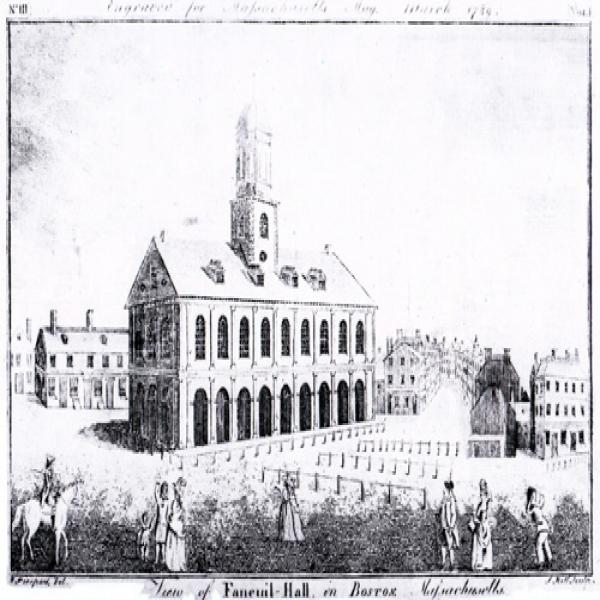View of Faneuil Hall
Original

Background Notes
Faneuil Hall was constructed near the old town dock in 1742 through funding of prominent Boston citizen Peter Faneuil. In 1761, the hall was reduced to ashes and rebuilt by means of public lottery. Considered "perhaps the first colonial experiment in a municipal auditorium"[1], the hall and market place served as an important public venue where voting and town meetings took place.
The town meeting played a key role in the revolutionary period, both as a decision making body in which actions leading to the war were agreed upon, as well as a post-war forum where ideas concerning the social and political spheres of the Early Republic were solidified. Here, Samuel Adams championed revolt against the taxes levied on the colonies. Debates at town meetings held at Faneuil Hall led to the opposition of the Sugar Tax of 1764, and the Stamp Act of 1765. The value of these meetings was rooted not solely in the actual choices and actions made, but also in the men of the town making and applying their own decisions of varying magnitudes in council, or in effect, governing themselves. This type of citizenry was so important to colonists that it was not uncommon for meetings to last for two or more days to allow for extended debate. [2]
By 1805, Faneuil Hall was no longer big enough to handle Boston's expanding population. An addition designed by Charles Bulfinch was put up around the original structure, doubling it in both height and width.
1. Hart, Albert (Ed). Commonwealth History of Massachusetts, Vol II. (New York: The States History Company, 1928). 239
2. Hart, 241
Transcription of Primary Source
(above) No. III] - Engraved for Massachusetts Mag. March 1789. - [Vol. I. /
(below) W. Pierpont, Del. - S. Hill Sculp. / View of Faneuil-Hall, in Boston, Massachusetts.